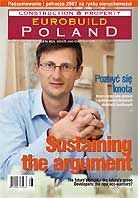The construction boom has grown without restraint for several years, as shown by the properties which have to be managed. But no new players are appearing on the FM market. Has the cake already been divided with newcomers resigned to eating the crumbs?Interest in the construction and development sector continues unabated. New investors and developers, foreign companies and those from other industries are appearing almost daily. Openings of new buildings take place almost every day, cornerstones are being laid and ribbons cut. But having said that, it must be noted that the last facility management company claiming to hold a significant property portfolio started operations on the Polish market more than 2 years ago.Competing in two leaguesIzabela Mucha, a property manager at Cushman & Wakefield, and also a board member of the Polish Federation of Property Managers Associations, claims that: “It is said that two kinds of companies offering FM services and dealing in FM management are




























































